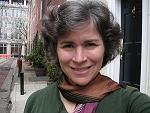
 |
THE LANDES REPORT |
Save The Earth! Start With Scallions, Proceed to Wild Violets, & Wonder At Worms!
By Lynn Landes (4/22/09)
Plant a scallion and save the planet? Thatís perhaps an exaggeration, but not really. The scallion opens our mind to the practical possibilities of the natural world around us, the food beneath our feet, and all its various uses. And when windows open, we can fly through, away from our dark dependency on consumerism and into the light of useful knowledge!
Enough of the hyperbole. I hate to shop and love to experiment.
Last year, I discovered that the common scallion (available at food stores everywhere) makes a great all-purpose cleaner. I now take a bath in scallion juice (place scallions and water in blender, then sieve), wash my hair, do the dishes, the laundry, clean windows and mirrors, sinks and tubs, floors and furniture. The mighty scallion grows like a weed, both indoors and out. And I donít spend a dime on cleaners anymore! Who knew an onion could do so much good?
Once-upon-a time I bought eco-cleaning products. All designed to save the planet. But, lurking in the back of my mind were many nagging doubts. Firstly, many of those planet-friendly products were encased in plastic. Most plastic is a petrochemical poison. Itís packed with cancer-causing chemicals that can never be proven safe. And the estrogen-mimicking hormones released from many plastics will spell the end of human procreation if we donít stop using the stuff, and soon! Secondly, the products I was purchasing were more well-traveled than my airline pilot husband. And finally, they were made by people under conditions I could never really know. Something had to change.
So, with the scallion success under my belt and my guilty conscience partially relieved, I began to look at the weeds that thrive in my Center City Philadelphia neighborhood. I was already growing in my kitchen several foods that I purchased at the grocery store: garlic, celery root, beets, sweet potato, and carrots. It was their greens, for eating, I was after. Outside, my garden wall has planters filled with herbs, including thyme, rosemary, and sage. But, my ultimate goal was to use plants that grew wild. So, I looked up ďedible weedsĒ on the Internet to guide my foraging.
I first zeroed in on the Wild Violet. It grows everywhere, in many peopleís lawns and remarkably in my neighborhood between the many bricks that make up our tiny 19th Century streets. On first tasting the Wild Violet, I was surprised how mild it was, similar to Green Leaf Lettuce. (Frankly, I canít handle the taste of the much heralded weed, the Dandelion. Itís just too bitter, cooked or not.) So, the Wild Violet was a wonderful surprise.
Encouraged, I experimented with other American weeds (although routinely used as vegetables in other parts of the world), including purslane, plantains (tastes like mushrooms), and scurvy weed. I would walk or ride my bike around town with a keen eye toward the wayward weed. Although I still rank low on the learning curve when it comes to knowing my weeds, Iím very encouraged and highly motivated to learn more.
For the latest on Lynn Landes, see the Philadelphia Inquirer 4/22/09: http://www.philly.com/inquirer/image/20090422_Hard-core_green.html